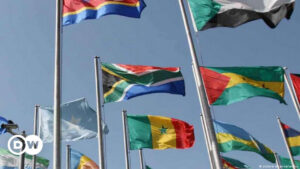[ad_1]
According to the IMF’s World Economic Outlook, South Africa is projected to achieve a gross domestic product (GDP) of $401 billion at current prices in 2024. This places South Africa ahead of Nigeria, with a GDP of $395 billion, and Egypt, with a GDP of $358 billion.
However, this temporary ranking is expected to shift in the following years, with South Africa giving up its leading position to Nigeria in 2025 and then falling to third place behind Egypt in 2026. These findings were released in the recent report by the IMF.
Although IMF data has indicated that Nigeria’s economy surpassed South Africa’s in 2018, Nigeria has faced economic challenges due to a drop in oil production, high inflation, and a devaluation of the naira. As Bloomberg economists suggest, the IMF’s projections reflect expectations of meaningful reforms taking place. South Africa’s brief ascendancy in 2024 is primarily due to the declining GDP of Nigeria and Egypt in dollar terms following significant currency devaluations. Nevertheless, the long-term trajectory shows Nigeria and Egypt regaining their top spots, with Nigeria leading the way. To realize the GDP expansion forecasted by the IMF, Nigeria needs to restore oil output to its potential, address security issues, and overcome obstacles in the power sector.
Since taking office as the president of Nigeria, Bola Tinubu has introduced substantial policy changes aimed at improving the nation’s finances. These changes include reforming the foreign-exchange system, discontinuing costly gasoline subsidies, and addressing issues related to the scarcity of dollars while boosting tax revenue. While these measures have brought initial challenges to Africa’s most populous nation, they are expected to yield benefits in the long run. The IMF predicts a GDP growth rate of 3.1% for Nigeria in the coming year, up from 2.9% in 2023.
The reforms implemented by the Nigerian government are anticipated to result in stronger and more inclusive economic growth, as stated by Daniel Leigh, division chief in the IMF’s research department. In Egypt, currency devaluations have occurred three times since early 2022, as the country grapples with a foreign-exchange crisis and a significant devaluation of the Egyptian pound against the U.S. dollar. The government obtained a $3 billion IMF package last year, contingent on adopting a more flexible exchange rate, a move likely to happen after December elections where President Abdel-Fattah El-Sisi is seeking to extend his rule until 2030. This delay has paused IMF reviews scheduled for March and September, which could potentially unlock $700 million in postponed loan tranches, access a $1.3 billion resilience fund, and encourage significant Gulf investments.
Egypt is currently in discussions with the IMF to increase its rescue package to over $5 billion, aiming to overcome obstacles preventing support, including addressing concerns regarding currency policies. Should a reform agenda be implemented, it could underpin an economic growth rate of 5% or more from 2026, according to the IMF.
In contrast to Nigeria’s naira and Egypt’s pound, South Africa’s rand is free-floating and has lost approximately 10% of its value against the U.S. dollar this year. The currency’s weakness is attributed to concerns about the National Treasury’s ability to meet budget deficit and debt-to-GDP targets due to increased state support demands and revenue shortfalls. Issues like a deteriorating transport network and frequent power outages have also hindered economic growth. The IMF projects South Africa’s economy to grow by 0.9% in 2023 and 1.8% in 2024, with the potential for accelerated growth of 2.5% to 3% if the country addresses power shortages, logistical bottlenecks, and implements various reforms.
[ad_2]
Source link




